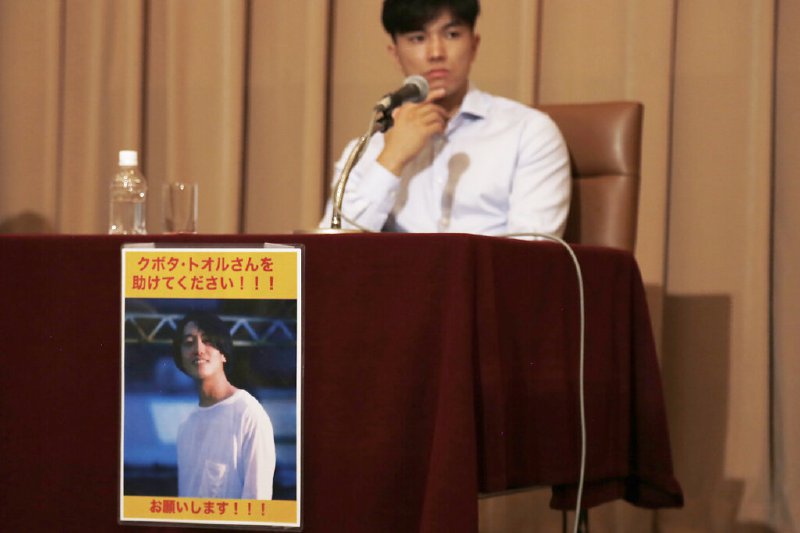
FILE – An image of Toru Kubota, a Japanese journalist detained in Myanmar while covering a protest, is displayed at the Japan Press Club in Tokyo on Aug. 3, 2022 as his friends gathered at the club calling for his immediate release.
17:27 JST, October 6, 2022
BANGKOK (AP) — A court in military-ruled Myanmar has sentenced a Japanese journalist to prison after he filmed an anti-government protest in July, a Japanese diplomat and the Southeast Asian nation’s government said Thursday.
Toru Kubota was sentenced Wednesday to seven years for violating the electronic transactions law and three years for incitement, said Tetsuo Kitada, deputy chief of mission of the Japanese Embassy. The sentences were to be served concurrently.
A statement sent to journalists from the military’s information office explained that Kubota was sentenced to seven years in total, while a trial continues on the charge of violating immigration law against him.
The electronic transactions law covers offenses that involve spreading false or provocative information online, and carries a prison term of seven to 15 years. Incitement is a catch-all political law covering activities deemed to cause unrest, and has been used frequently against journalists and dissidents, usually with a three-year prison term.
Kubota was arrested on July 30 by plainclothes police in Yangon, the country’s largest city, after taking photos and videos of a small flash protest against Myanmar’s 2021 takeover by the military, which ousted the elected government of Aung San Suu Kyi.
Kubota was the fifth foreign journalist detained in Myanmar after the military seized power. U.S. citizens Nathan Maung and Danny Fenster, who worked for local publications, and freelancers Robert Bociaga of Poland and Yuki Kitazumi of Japan were eventually deported before serving full prison sentences.
Since the military seized power in February last year, it has forced at least 12 media outlets to shut down and arrested about 142 journalists, 57 of whom remain detained. Most of those still detained are being held under the incitement charge, for allegedly causing fear, spreading false news, or agitating against a government employee.
Some of the closed media outlets have continued operating without a license, publishing online as their staff members dodge arrest. Others operate from exile.
The army’s takeover triggered mass public protests that the military and police responded to with lethal force, triggering armed resistance and escalating violence that have led to what some U.N. experts characterize as a civil war.
According to detailed lists by the Assistance Association for Political Prisoners, a watchdog group based in Thailand, 2,336 civilians have died in the military government’s crackdown on opponents and at least 15,757 people have been arrested.
The military said soon after Kubota’s arrest that he was detained while taking pictures and videos of 10-15 protesters in Yangon’s South Dagon township. It claimed he confessed to police that he had contacted participants in the protest a day earlier to arrange to film it.
A graduate of Tokyo’s Keio University with a master’s degree from the University of the Arts London, Kubota, 26 at the time of his arrest, has done assignments for Yahoo! News Japan, Vice Japan and Al Jazeera English.
His work has focused on ethnic conflicts, immigrants and refugee issues, including the plight of Myanmar’s persecuted Rohingya Muslim minority. The military is particularly sensitive about the Rohingya issue because international courts are considering whether it committed serious human rights abuses, including genocide, in a brutal 2017 counterinsurgency campaign that caused more than 700,000 members of the Muslim minority to flee to neighboring Bangladesh for safety.
Kubota’s countryman Kitazumi, a freelance journalist, was arrested in April 2021 and freed and deported just under a month later, after being indicted but not tried.
The military government said at the time it decided to release Kitazumi “in consideration of cordial relations between Myanmar and Japan up to now and in view of future bilateral relations, and upon the request of the Japanese government special envoy on Myanmar’s national reconciliation.”
Japan has historically maintained warm relations with Myanmar, including under previous military government. It takes a softer line towards Myanmar’s current government than do many Western nations, which treat it as a pariah state for its poor human rights record and undermining democracy, and apply economic and political sanctions against its army rulers and their families and cronies.
Top Articles in World
-

Israeli Ambassador to Japan Speaks about Japan’s Role in the Reconstruction of Gaza
-

Videos Plagiarized, Reposted with False Subtitles Claiming ‘Ryukyu Belongs to China’; Anti-China False Information Also Posted in Japan
-

North Korea Possibly Launches Ballistic Missile
-

Chinese Embassy in Japan Reiterates Call for Chinese People to Refrain from Traveling to Japan; Call Comes in Wake of ¥400 Mil. Robbery
-

Russia: Visa Required for Visiting Graves in Northern Territories, Lifting of Sanctions Also Necessary
JN ACCESS RANKING
-

Japan PM Takaichi’s Cabinet Resigns en Masse
-

Japan Institute to Use Domestic Commercial Optical Lattice Clock to Set Japan Standard Time
-

Israeli Ambassador to Japan Speaks about Japan’s Role in the Reconstruction of Gaza
-

Man Infected with Measles Reportedly Dined at Restaurant in Tokyo Station
-

Videos Plagiarized, Reposted with False Subtitles Claiming ‘Ryukyu Belongs to China’; Anti-China False Information Also Posted in Japan
























